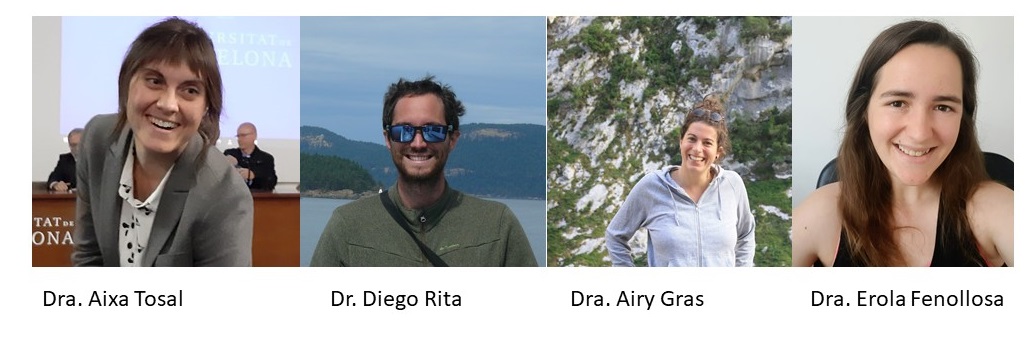13-07-2022
Margarita Salas Grants for the training of young doctors 2021
The purpose of the call for applications is to train young doctors by subsidising stays, carried out on a continuous basis, at a Spanish public university, at foreign universities or research centres or at Spanish public research organisations (other than the centres where the pre-doctoral training was carried out and the doctorate was obtained).
The Margarita Salas grants awarded in 2022 to young researchers at IRBio were as follows:
Airy Gras
Researcher at the EtnoBioFiC research group (www.etnobiofic.cat), at the Botany Laboratory of the Faculty of Pharmacy and Food Sciences of the University of Barcelona and the Botanical Institute of Barcelona, a joint centre of the CSIC and the Barcelona City Council. Her research focuses on ethnobotany, on inventorying and conserving traditional knowledge related to biodiversity with the aim of preserving this heritage and forming the basis for future research to obtain new medicines, foods and other products related to human well-being. Currently, within the framework of the grant Margarita Salas is doing a postdoctoral stay with Dr. Quave's research group (https://etnobotanica.us/) at Emory University (Atlanta, USA), to train in phytochemistry and microbiology and thus associate the medicinal uses of plants cited in ethnobotany in the Catalan language with their active compounds and test their activity.
Diego Rita
Researcher in the consolidated research group of Large Marine Vertebrates, Department of Evolutionary Biology, Ecology and Environmental Sciences, University of Barcelona where he did his PhD. Currently he has obtained a Margarita Salas grant to work for two years at the University of the Balearic Islands in the Marine Ecology and Systematics group, led by Dr. Nona Agawin. In her current research, she is investigating the impact of emerging pollutants, such as microplastics or sun creams, on Posidonia oceanica populations in the Balearic Sea.
Aixa Tosal
Researcher at the Department of Earth and Ocean Dynamics of the Faculty of Earth Sciences (University of Barcelona). My research focuses on Cenozoic continental deposits (from 65 Ma to the present) and the interaction between vegetation and climate. Currently, within the framework of the Margarita Salas grant, she is developing a project that analyses the palaeoecological and palaeoclimatic causes that conditioned the flora of southwestern Europe (France and NE Iberian Peninsula) during the Eocene-Oligocene traffic (34 -28Ma) in order to better understand its influence on the appearance of the Mediterranean flora 5Ma ago. She will also carry out specific training in ecophysiology to infer the climatic adaptations of fossil leaves. This is a two-year project, the first year at the Centre de recherche en Paleontologie-Paris (CR2P), specifically at the Muséum national de Histoire naturelle de Paris (France), the second year at the University of Barcelona, UB, specifically at the Dept. of Earth and Ocean Dynamics (Fac. of Earth Sciences).
Erola Fenollosa
Margarita Salas postdoctoral researcher at the Department of Biology of the University of Oxford (UK) with Dr. Roberto Salguero-Gómez during the first year and at the Department of Evolutionary Biology, Ecology and Environmental Sciences of the University of Barcelona with Dr. Sergi Munné during the second year. His research interests focus on the interaction between the physiological response of plants in relation to their environment, demographic responses and species distribution. During her PhD and previous postdocs she studied how the ecophysiology of invasive plants contributed to understanding their invasive success through the use of physiological markers such as variations in photosynthetic pigment content, antioxidants, accumulation of damaged molecules, etc., as well as the characterisation of variability in seed attributes. As a postdoctoral researcher in the SalGo Team, she combines experimental approaches with ecological modelling to examine biological invasion processes by predicting the distribution of invasive species under different environmental scenarios (climate change). Learn more.
